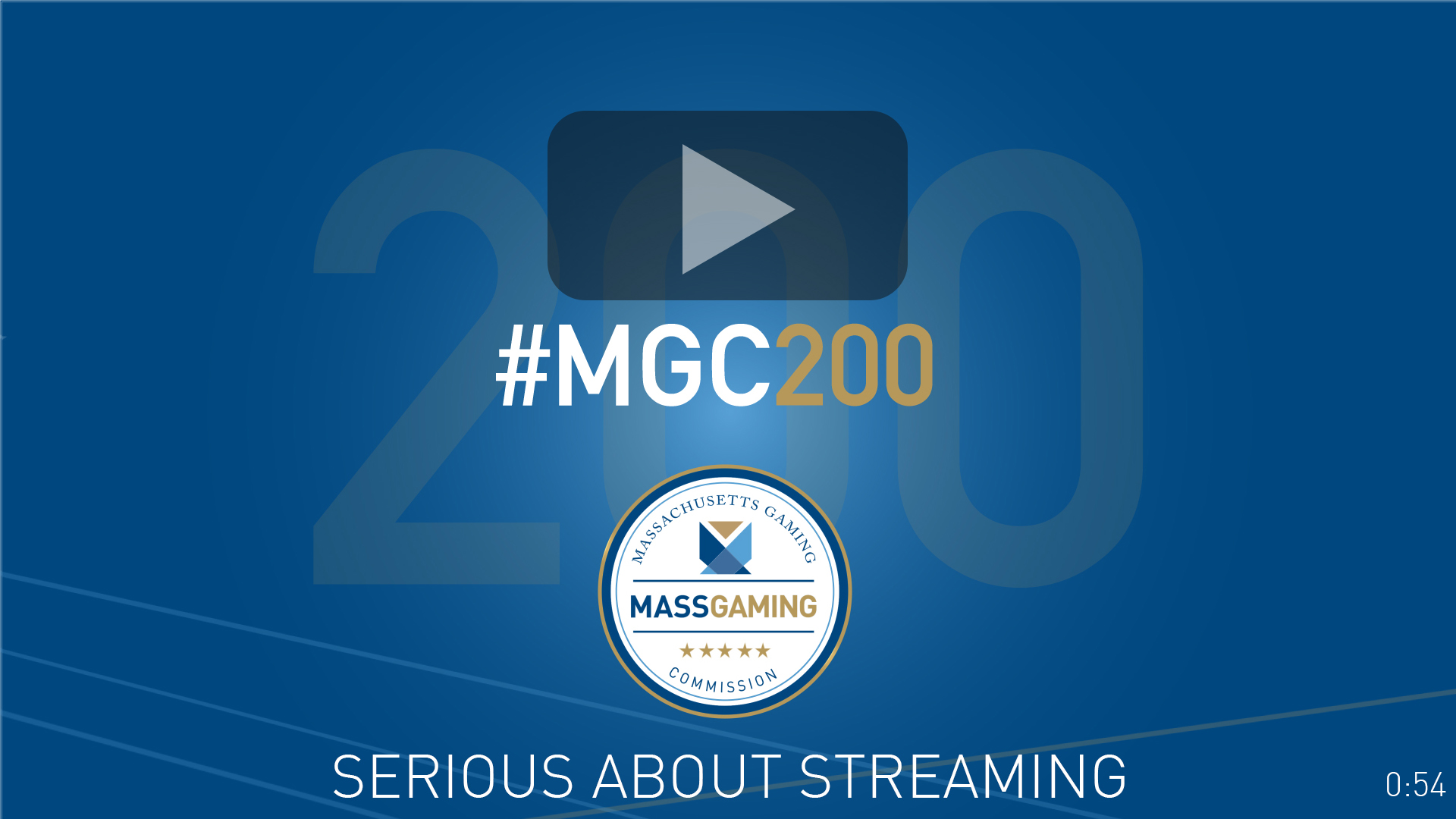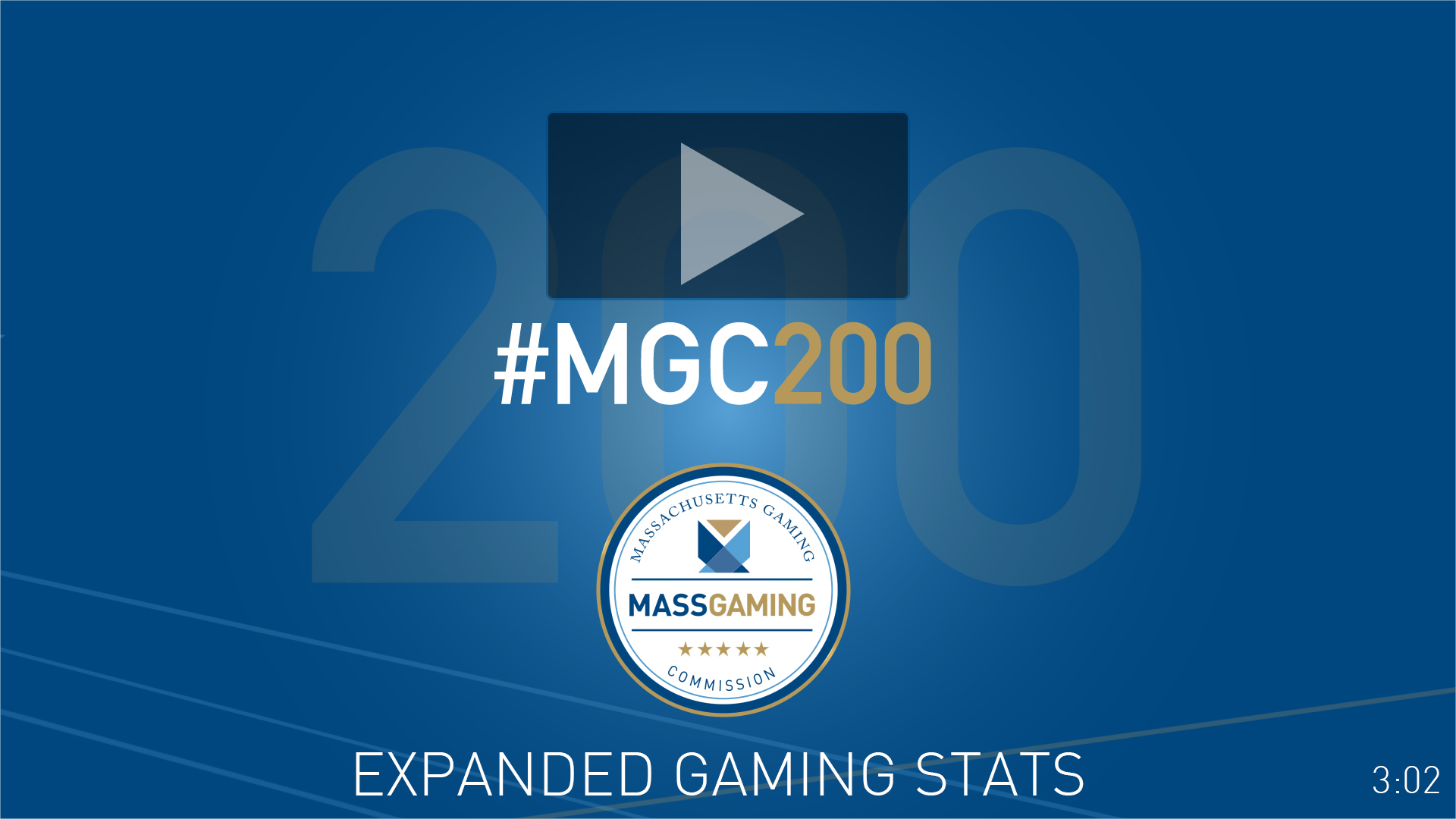#MGC200! The Massachusetts Gaming Commission marks milestone 200th public meeting
- September 19, 2016
- by MGC Communications
- 0 comments
Have you watched all of MGC’s live streams? In that same amount of time, you could also watch…
The Massachusetts Gaming Commission (MGC) announces that on September 22, 2016, it will conduct its 200th open public meeting. The Commission is pleased to mark this significant milestone as part of the ongoing implementation and regulation of the state’s developing expanded gaming industry. MGC’s 200th meeting will take place on September 22, 2016 at 10:00am at 101 Federal Street 12th floor in Boston.
On April 10, 2012, Chairman Steve Crosby opened MGC’s first-ever public meeting by pledging the Commission’s early commitment to accessibility and outlining MGC’s anticipated efforts to achieve transparency, “We are working on an elaborate methodology and approach to outreach, and we will be asking to hear from the public… We take our mandate to design and implement a participatory, transparent and fair process. This is the first step in that direction and we are committed to making that be our top priority from every moment that we proceed,” Chairman Crosby further states MGC’s intention to provide the public with online access and conveniences including live streams of public meetings, “So wherever we hold our meetings, the people of western Massachusetts, North Shore, South Shore, Cape Cod and the Islands will have every bit as much access to our activities as anybody else in the Commonwealth…”
As of MGC’s 199th meeting, the Commission has generated 38,186 pages of transcripts, 199 live streams, 588 hours of video, and has traveled the Commonwealth hosting public meetings and hearings in locations including: Boston, Springfield, West Springfield, Everett, Revere, Wrentham, Raynham, Easton, Plainville, Leominster, Lancaster, Brockton, Holbrook, Mashpee, Palmer, Worcester, Framingham and Lynn. The Commission also maintains a robust online Meeting Archive that provides timely meeting minutes, transcripts, videos and commissioners packets from every public meeting.
As the Commission marks its 200th meeting, it would also like to take this opportunity to reflect on the Gaming Act and its strengths. The Massachusetts gaming statute is regarded as perhaps the most comprehensive, thoughtful and advanced gaming law in the country. The Legislature is nationally lauded for having wisely placed significant emphasis on competition, local control, research, and mitigation of problem gambling and any other foreseen and unforeseen adverse impacts caused by licensed gaming establishments.
As we approach the 200th meeting, where are we now?
As mandated by the Legislature, the Massachusetts Gaming Commission has been focused on two major objectives- 1.) Generate jobs, economic development and revenue for the Commonwealth and 2.) Minimize the unintended, negative consequences of expanded gaming
PLAINRIDGE PARK CASINO: In the first full year of operation at Plainridge Park Casino (PPC), the Commission can report the following in our effort to achieve our two Legislative mandates:
- Generate jobs, economic development and revenue for the Commonwealth.
- JOBS: PPC currently employs approx. 520 people. Research indicates that 112 of the 520 employees were unemployed prior to their employment at PPC. During the construction phase, PPC employed approximately 1,000 construction workers.
- ECONOMIC DEVELOPMENT: PPC spends approximately $1.7 Million annually on Massachusetts vendors. PPC awarded $97.5 Million in direct construction contracts, with $30.8 Million (32%) awarded to minority, women and veteran-owned businesses. The Town of Plainville is utilizing $2 Million in casino funds to plan for a new public safety and town hall complex.
- REVENUE: In its first year of operation, PPC has generated $160 Million in Gross Gaming Revenue, which translated into $82 Million in state taxes, $67 Million for local aid, and $15 Million for the Race Horse Development Fund. In addition, our financial analysis indicates that PPC has recaptured approximately $30 Million in slot revenue from out of state competitors, and generated approximately $130 Million in new revenue from the New England gaming market.
- ADDITIONAL: Harness racing industry is experiencing positive impacts from PPC, in terms of more horses racing, many more race days, and increased betting proceeds.
- Minimizing the unintended negative consequences of the introduction of expanded gaming.
- RESPONSIBLE GAMING: MGC is receiving international recognition for its innovative efforts in the area of problem and responsible gaming. PPC is the only casino in the country required to have an on-site responsible gaming program: in conjunction with the Mass Council of Compulsive Gambling, MGC developed the GameSense Info Program, staffed 7 days a week by GameSense Advisors. MGC recently launched a first-of-its-kind budgeting tool known as PlayMyWay, a voluntary method of notifying patrons of their slot machine play. It has received more than 5000 enrollees and that number increases daily.
- PUBLIC SAFETY: In April, the Commission received its 1st public safety impact report. The comprehensive analysis concludes that there has been no increase in crime due to the opening of Plainridge Park Casino. The analysis did indicate some increase traffic-related calls for service which were considered to be commensurate with any similar sized facility.
- LOTTERY: There has been no identifiable negative impact on lottery sales since PPC opened. In May 2016, PPC reported lottery sales for the first quarter of 2016 at the slots facility to be more than $700,000.
WYNN BOSTON HARBOR: Wynn has officially begun full construction on its $2.1 billion resort-casino in Everett. It is expected to generate 4,000 permanent jobs and 4,000 construction jobs. The anticipated opening is June 2019.
MGM SPRINGFIELD: MGM Springfield is in full construction of its mixed-use $950 million resort-casino in Springfield. It is expected to generate 3,000 permanent jobs and 2,000 construction jobs. Anticipated opening is September 2018.
Distinctive strengths of the Massachusetts Gaming Act:
Competition
- Gaming licenses are competitively awarded. In several other jurisdictions, both the gaming company and location were pre-determined by statute. MGC’s robust competitive process resulted in attracting numerous applications from the strongest gaming operators in the country with a total capital investment of $3.3 Billion.
Local Control
- A Host Community agreement and referendum are required before a casino company applies for a license.
- Surrounding Community agreements are also required – the only state to require such agreements.
- The statute also uniquely requires casino applicants to sign mitigation agreements with live entertainment venues that might be negatively affected by casino live entertainment.
Research
- The statute requires a comprehensive first-of-its-kind Research Agenda to study the socio-economic impacts of gaming. The Commission completed a baseline study prior to the introduction of casinos, and will conduct similar subsequent studies to ascertain associated impacts. While there have been studies that look at the impacts of casinos retrospectively, no other research project exists with a comprehensive and direct look at the before and after.
Responsible Gaming
- The statute demands true innovation in areas related to responsible gaming and problem gambling. This has resulted in the Commission’s adoption of the innovative “GameSense” program and the implementation of a voluntary budgeting tool for patrons known as “PlayMyWay”.
Learn more about expanded gaming and #MGC200:

